Autumn is cornucopia time in the book world. Publishers’ lists are crammed with a harvest of the latest efforts of the big guns and the debut works of promising newbies. I’ve been enthralled, educated, amused, and moved by a great many of the books I’ve read this season. And here are some of the ones I enjoyed or wondered at the most.
KEEP READING AND ENTER TO WIN A COPY OF ONE OF LINDA’S FALL PICKS!
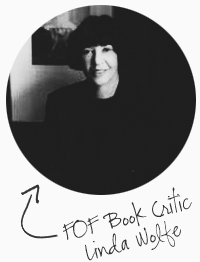
FOF award-winning author, Linda Wolfe, has published eleven books and has contributed to numerous publications including New York Magazine, The New York Times, and served the board of the National Book Critics Circle for many years.
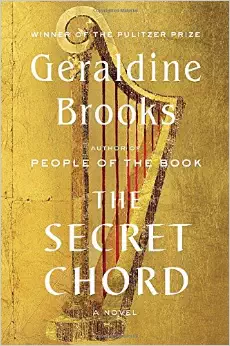
THE SECRET CHORD
by Geraldine Brooks
Viking.
Brooks is one of my favorite authors. She has a knack for coming up with the most daring and delicious ideas for books, and the extraordinary ability to give life to those ideas. She does this with such skill that it leaves the reader, this reader anyway, altogether breathless, and given to muttering, “How the hell does she do this!”
Her first novel was Year of Wonders, in which she imagined the struggles of a young woman in a 17th-century English village struck by the plague. The next was March, in which she imagined the Civil War experiences of a character whose life had never before been portrayed, although he was a presence, albeit an absent one, in Louisa Mae Alcott’s Little Women — Mr. March, the father of Jo and her sisters. There have been other fascinating novels, and now comes the wondrous, The Secret Chord. This time the principal character is one whose story we may all think we already know: King David of Biblical fame. The Old Testament tells us bits and pieces about him. He slew Goliath, he played the harp, he wrote some psalms, he became Israel’s first king, he was very attached to the son of his predecessor in power, Saul, he sends a man to his death so that he can steal his wife, and he weeps uncontrollably at the death of his son, Absalom. But Biblical tales are event-bound; in those days those who told tales merely said what happened and didn’t go into the kind of emotional and psychological probing that contemporary authors offer and that we contemporary readers relish.
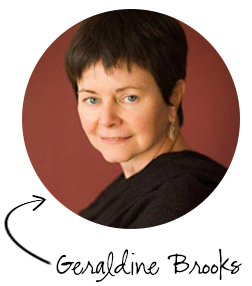 Brooks does probe into the inner David. What makes people tick – and love or languish, believe or betray, become winners or losers — is her métier. She gives us a look not only into what made David tick, but a view into his very soul. Her David is a neglected son (chosen by God), an adolescent show-off vying for the attention denied him in childhood (taking on Goliath), a brilliant musician and poet (those Psalms), a savage warrior (those battles), a Machiavellian administrator (the Kingdom and the power) a passionate — and possibly bisexual — lover (Abigail; Bathsheba; Jonathan), an adored but deeply flawed human being. His lifelong adviser, the prophet Natan, thinks David’s people “loved him all the more because he was flawed, as they were, and did not hide his passionate, blemished nature.”
Brooks does probe into the inner David. What makes people tick – and love or languish, believe or betray, become winners or losers — is her métier. She gives us a look not only into what made David tick, but a view into his very soul. Her David is a neglected son (chosen by God), an adolescent show-off vying for the attention denied him in childhood (taking on Goliath), a brilliant musician and poet (those Psalms), a savage warrior (those battles), a Machiavellian administrator (the Kingdom and the power) a passionate — and possibly bisexual — lover (Abigail; Bathsheba; Jonathan), an adored but deeply flawed human being. His lifelong adviser, the prophet Natan, thinks David’s people “loved him all the more because he was flawed, as they were, and did not hide his passionate, blemished nature.”
The book throbs with battles, love affairs, power struggles, twists of fate and fortune. Think “Game of Thrones” with some Shakespeare and Dostoyevsky thrown in. The customs, rituals and daily life of the vanished people of an ancient Middle East civilization become amazingly vivid, and so too do David’s competitive generals, his rivalrous son, Absalom, and several of his reputedly hundreds of wives. How the hell does she do it? To read a Brooks novel is not just to become engrossed by a story, but to leave one’s own time and become immersed in another time and another world altogether. It’s really escapist fiction, albeit of the highly literary sort.
![]()
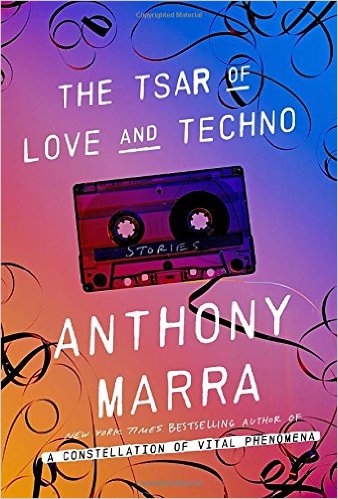
THE TSAR OF LOVE AND TECHNO
by Anthony Marra
Random House.
If you haven’t already read the extravagantly talented Anthony Marra you really have a treat coming to you. His first book, A Constellation of Vital Phenomena, won the National Book Critics Circle John Leonard prize for a debut work. That novel was about the wars in Chechnya, a place which, at the time Marra became interested in writing about it, he could barely spell and had never visited. (Indeed, he didn’t actually go to Chehnya until Constellation was finished and about to be published.) But, upending the literary adage that holds that writers should write about what they know, Marra had decided that one should write about what one wants to know – something that I myself strongly believe to be good advice. Through arduous and deft research into journalistic and historical sources, he learned enough about Chechnya to get the look and even the feel of the place onto paper, and to create authentic and unforgettable Chechnyan characters.
The Tsar of Love and Techno, a collection of interconnected stories, is about Chechnya, too. But it’s also about the Soviet Union – a place Marra had been to, having spent an undergraduate semester in St. Petersburg, and where he’d often seen the wounded and soul-scarred veterans of Russia’s war against its neighbor begging and drinking on the streets. In Tsar, he tells the story of one such veteran, Kolya, a conscripted soldier from Kirovsk, a town in Siberia, and of Galina, his high school sweetheart, the beautiful but clumsy granddaughter of a prima ballerina banished to a Siberian prison camp at the height of her career. It is also the tale of the artist who was forced to eliminate from photographs people the Soviet authorities wanted purged from history — among them the ballerina — and of Vera, whose daughter flees Kirovsk to become a mail-order bride in America, and of a host of other inhabitants of the town.
 Indeed, Kirovsk itself is virtually a character in the book, with its polluted air, frozen landscape, sunless days, fake forest of metal and plastic plastic birch trees erected in Soviet era by the homesick wife of a party boss, and its population doomed by dint of inhumane mining conditions to lifespans half the length of American lives. I suppose this sounds like grim reading. But in fact these stories, although often heartbreaking, are exhilarating. They brim with love, the love not just between men and women, but between fathers and sons, mothers and daughters, brothers, and will haunt you long after you have finished the book.
Indeed, Kirovsk itself is virtually a character in the book, with its polluted air, frozen landscape, sunless days, fake forest of metal and plastic plastic birch trees erected in Soviet era by the homesick wife of a party boss, and its population doomed by dint of inhumane mining conditions to lifespans half the length of American lives. I suppose this sounds like grim reading. But in fact these stories, although often heartbreaking, are exhilarating. They brim with love, the love not just between men and women, but between fathers and sons, mothers and daughters, brothers, and will haunt you long after you have finished the book.
![]()
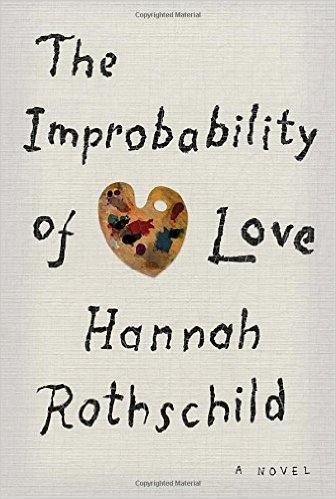
THE IMPROBABILITY OF LOVE
by Hannah Rothschild.
Knopf.
This skullduggery-packed novel is great fun. Annie, an impoverished London cook who dreams of becoming a great chef, is idly shopping in a thrift store when she spots a dusty little painting that appeals to her and purchases it for a song. The painting will turn out to be a lost masterpiece by Watteau. But before Annie finds this out, the Watteau will be stolen from her, and a host of superrich art collectors will be salivating at the prospect of getting their hands on the painting. The collectors include a Russian Mafioso, a down-at-heels aristocrat, and a grande dame of British society. Unfortunately for the lot of them, the hands that now hold the painting are those of a corrupt and vicious gallery owner with a history of sneaking Jewish-owned paintings out of Nazi Germany.
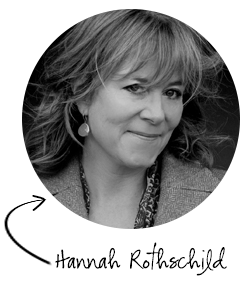 Along the way to the resolution of this nasty situation, Annie will fall in love, the gallery owner’s daughter will commit a crime, and the painting will speak, irreverently gossiping about his previous owners, who included crowned heads of Europe. He – it? – will also irritably recount the humiliation of having been transported from the thrift shop to Annie’s dreary abode in a shopping bag on the handles of her bike, but will in time come to admire and extol her extraordinary culinary skills. The painting is snobbish but loveable, Annie is pig-headed but lovable, and the art collectors, not to mention the gallery owner and his family, are folks you will love to hate.
Along the way to the resolution of this nasty situation, Annie will fall in love, the gallery owner’s daughter will commit a crime, and the painting will speak, irreverently gossiping about his previous owners, who included crowned heads of Europe. He – it? – will also irritably recount the humiliation of having been transported from the thrift shop to Annie’s dreary abode in a shopping bag on the handles of her bike, but will in time come to admire and extol her extraordinary culinary skills. The painting is snobbish but loveable, Annie is pig-headed but lovable, and the art collectors, not to mention the gallery owner and his family, are folks you will love to hate.
The author knows the scene of which she speaks. She’s a member of the Rothschild family, and currently the chair of Britain’s National Gallery of Art.
![]()

PURITY
by Jonathan Franzen.
FSG.
Michiko Kakutani, reviewing this book for The New York Times, said it was “Mr. Franzen’s most fleet-footed, least self-conscious and most intimate novel yet.” I am a fan of Kakutani, and generally agree with her critical evaluations. But I am no fan of Purity. I have liked Franzen’s previous novels. I thought The Corrections excellent, Freedom a little less so. But this one! Spending time with it is like being out for the evening with some garrulous running-off-at-the-mouth acquaintance, who you wish would shut up once in a while. Which is not to say that I didn’t read every last word. Because yes, the book is fleet-footed. It moves like the wind. But alas, that’s all it is, a lot of wind.
It’s the story of a young woman named Purity (get it! she’s the decent one!) and nicknamed, in a wink at Dickens, Pip, who is trying to discover the identity of her father. We meet her paranoid overbearing mother, who won’t disclose this information, her inordinately wealthy grandfather, and a grab bag of other characters. There’s Andreas, a stand-in for Julian Assange of Wikileaks, who’s a narcissist who once murdered somebody back in Germany but is now a hacker, and environment-loving political activist; Tom, an ethical journalist who was once married to Pip’s mom and put up with her hysterical personality disorder for years before getting up the gumption to leave her (ah-hah, you say pretty soon, maybe he’s Pip’s father); Anabel, an East German feminist so ideologically correct that she makes her husband pee sitting down and who is now in California doing recruitment work for the hacker. There’s also a literally and figuratively crippled novelist, suffering at being underappreciated, and a jampack of other highly neurotic characters, as the plot swirls, swivels and leaps around from East Germany to California to Latin America to Colorado, and elsewhere.
 Presumably Franzen is trying to comment on or at least show us the new people among us, the hackers, earnest environmentalists, querulous authors, intrusive media practitioners, the 1%, and the politically correct. Intimate? The book isn’t intimate at all, as none of these characters, including the nebbish-like Pip, acquires and holds our sympathy, no one we get to know on any deep level. But yep, it’s fleet-footed. You can race thru its 563 pages in a few hours, even if, at the end, you’re likely to say, “So what?”
Presumably Franzen is trying to comment on or at least show us the new people among us, the hackers, earnest environmentalists, querulous authors, intrusive media practitioners, the 1%, and the politically correct. Intimate? The book isn’t intimate at all, as none of these characters, including the nebbish-like Pip, acquires and holds our sympathy, no one we get to know on any deep level. But yep, it’s fleet-footed. You can race thru its 563 pages in a few hours, even if, at the end, you’re likely to say, “So what?”
![]()
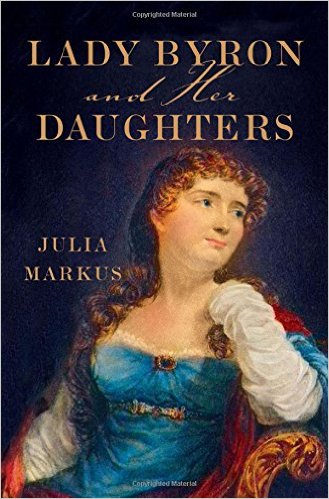
LADY BYRON AND HER DAUGHTERS
by Julia Markus.
Norton.
I’ve always known that the enormously talented poet, Lord Byron, was the western world’s first rock star, a flashy celebrity and the kind of classic bad boy to whom so many young women (and young boys, as it turned out in his case) are attracted –“mad, bad and dangerous to know,” one of his lovers memorably said of him. Adoring fans followed Byron’s every word, clutched at him, fawned over him, and forgave him all the bad behavior he was rumored to engage in. But I never knew, till I read Lady Byron and Her Daughters, just how bad that behavior was. Particularly when it came to his wife. He tormented her, despised her for her innocence, cursed at her, told her she was ruining his life, confessed to her that he’d had an affair with his half-sister, told her about an actress with whom he was currently having an affair, refused to allow her parents to visit, and one night even threatened her with a dagger.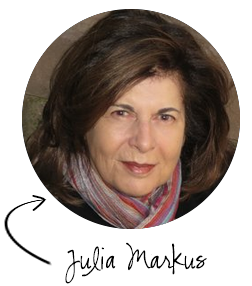
Lady Byron – nee Annabella Milbanke — finally got up the gumption to leave her abusive husband after a turbulent pregnancy during which he boasted that he intended to screw his actress lover right in their home while she was giving birth, and also that he hoped their child would be born dead. Annabella paid for her decision to leave him. She became despised and shunned by most of her contemporaries. They saw her as the villain of this piece, a cruel woman who had broken the “till death do us part” bit of marriage’s vows, and saw Byron as the sad, distraught lover, parted by her action from the child he had sired with her.
Annabella lived with society’s contempt for years, yet managed to make a name for herself in the world of philanthropy and to successfully raise the daughter she and Byron had had, Ada Lovelace, who became a pioneer in what eventually came to be known as computer science. She even, for a time, took care of the daughter Byron had with his half-sister. Her story is a fascinating one, and Markus tells her tale with wit, compassion, great story-telling style, and a twenty-first century feminist consciousness. She has, however, one annoying habit. She inserts herself into her narrative with gratuitous asides. Referring to Byron’s half-sister Augusta, whose nicknames were “Gussy” and “goose,” she butts in with, “She wasn’t such a goose at all,” and, describing Byron’s bad boy habit of flirting with his sister in his wife’s presence and wanting both women to kiss him, writes that it was a case of, “Kiss me, Bella. Kiss me, Gussy. Kiss me, Kate.” There’s also this: talking of Annabella’s critics as “the bizarro world of Lady-Byron bashing.” And that when Byron’s half-sister implored their daughter to confide in her, her words “channel, centuries ahead of its time, the outlandish mother of Absolutely Fabulous.”
I daresay Markus, a professor of English at Hofstra University, thought being so chatty and mod would make her book seem more readable, less academic. She didn’t need to. The book’s very readable and accessible without the silly asides,
![]()
FINALLY, SOME DON’T-MISS-SHORT-TAKES:
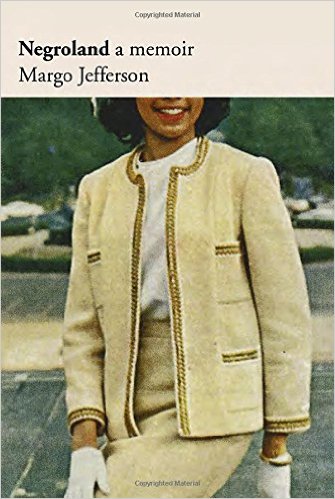
NEGROLAND
by Margo Jefferson.
Pantheon.
Partly a memoir and partly a work of social history, Negroland is an insightful and poignant look at the life of upper-middle-class African Americans by the Pulitzer Prize-winning book critic Margo Jefferson. It explores through Jefferson’s life the privileged centuries-old legacy of free Negroes in America. It was hard work for the author to uphold this legacy. “We were to be ladies, responsible Negro women, and indomitable,” Jefferson writes, and sometimes she suffered from depression and anxiety over living up to what was expected of her. But for all the anguish she endured for having been reared to be a standard bearer for her race, Jefferson emerges as exactly what her pediatrician and social worker parents, hoped she would be: indomitable. Not to mention an exquisite, perceptive, and complex writer.
![]()
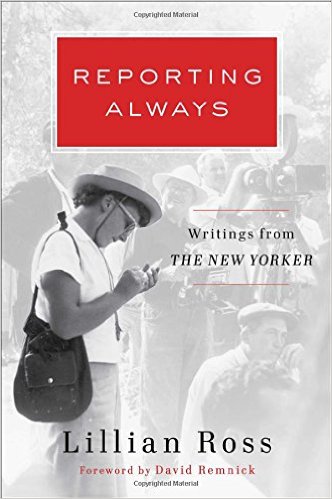 ALWAYS REPORTING
ALWAYS REPORTING
by Lillian Ross.
Scribner.
Ross was a pioneer of what came to be called the New Journalism, nonfiction that employs scenes and dialogue and other techniques that were once only the province of fiction. She was also a pioneer in breaking the gender barrier at the New Yorker. Editor-in-chief William Shawn had resisted hiring female staff reporters until World War II forced him to by drafting many of his male reporters. He was impatient with having women on his staff, Ross tells us, and “paid us less than the men.” But he was a good mentor, and with his tutelage, Ross emerged as a writer with astonishing ability. Always Reporting is a collection of her memorable three-dimensional profiles of such figures as Ernest Hemingway, Charlie Chaplin, Otto Preminger, John Huston and a host of other eminences who, although gone now, still have profound influence in today’s cultural life. Ross is 95 now, and yet still submits the occasional article to the New Yorker. This collection, like the author, seems ageless. It’s also priceless, restoring long forgotten pleasures to those of us who recall the thrill of finding a Lillian Ross piece in the magazine, and introducing those pleasures to those who, being younger, don’t know yet what they’ve been missing.
TO ENTER TO WIN YOUR BOOK OF CHOICE, COMMENT BELOW BY ANSWERING THE QUESTION: WHICH BOOK DO YOU WANT TO WIN AND WHY?
1 FOF will win. (See official rules, here.) Contest closes November 19, 2015 at midnight E.S.T. Contest limited to residents of the continental U.S.

0 Responses to “[GIVEAWAY & REVIEW] Linda Wolfe’s Fall Reading List”
hofken says:
I would like to win THE SECRET CHORD by Geraldine Brooks because I loved her People of the Book. This story sounds fascinating.
Susan Pertierra says:
I would love to win the book, ALWAYS REPORTINGby Lillian Ross. It looks like a fascinating account and memoir.
Mary W says:
I want to read Always Reporting or is it Reporting Always? I like reading books about strong women who are real. Even cooler is that Ross is still alive and continues to contribute. What an interesting person.
Melissa Green Hartley says:
I would love to win the Improbability of Love by Hannah Rothschild. It seems very interesting, a mystery perhaps? And I love any kind of book that is set in England 🙂 Thank you.
LindyLou says:
THE TSAR OF LOVE AND TECHNO
by Anthony Marra is my first pick as I haven’t had the pleasure of reading his first work , A Constellation of Vital Phenomena. It sounds interesting and I just ordered it online. His second work “The Tsar…” would bring me up to speed on this incredibly talented author…
Cathy McIvor says:
I am an avid reader and I am always reading a book. I’d love to read Negroland, A Memoir, by Margo Jefferson. I love to read memoirs, and this proves to be interesting.
Phyllis Lamken says:
Easy Peasey, I want to read Lady Byron and Her Daughters. It sounds great. Thank you for the giveaway.
ktpotat says:
the improbability of Love
Kim Cage says:
The Improbability of love sounds like an interesting read and is my first pick!
sandy haber says:
The secret chord, please. Her other books have been fantastic — March was super — and I think this one will be just as good.
Susan Beamon says:
Purity was recommended to me by my book club leader. I haven’t yet picked up a copy, so winning it would be great.
Christine Norman says:
The Improbability of Love sounds very intriguing with some suspense in it and is my number one choice.
Aisling says:
THE SECRET CHORD sounds like a fascinating book and I’d love to win a copy. David is a complex character and I’d like Brooks’ take on him. (Am adding it to my “must read” list also.)
Fran Kahn says:
Love a good mystery with a little love story thrown in-so I’d pick The Improbability of Love.
Maureen O'Neal says:
I’m ALWAYS dying to read Geraldine Brooks’ new book and this time’s no exception!